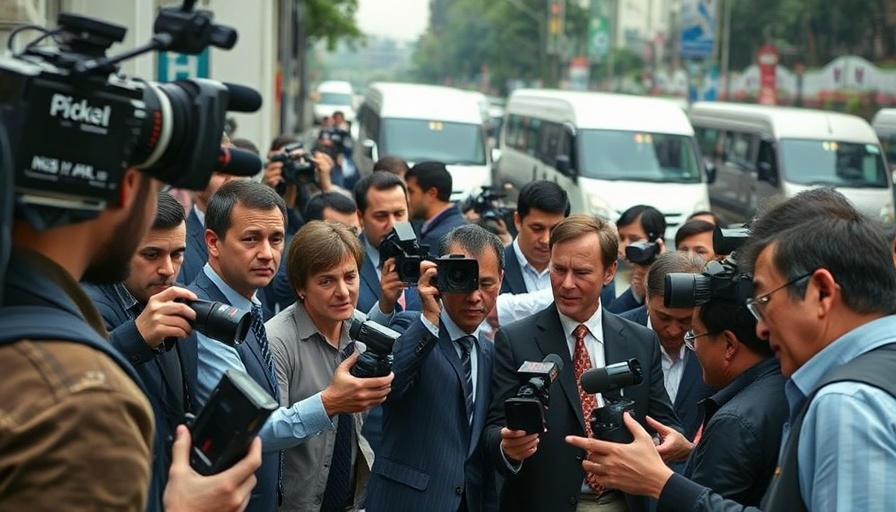
The Battle Over Free Speech and Immigration: The Case of Mahmoud Khalil
During a time of heightened tensions surrounding U.S. immigration policies and free speech rights, the case of Mahmoud Khalil, a Palestinian student activist at Columbia University, brings these issues to the forefront. Khalil’s arrest on March 9, 2025, by U.S. immigration authorities forms part of a controversial approach taken by the Trump administration against student protests critical of U.S. foreign policy, specifically regarding Palestine and Israel.
A Symbol of Activism: Who is Mahmoud Khalil?
Mahmoud Khalil was known for his significant role in organizing Columbia's pro-Palestinian protests, which demanded a ceasefire in Gaza amidst the Israel-Hamas conflict. His activism reflects broader concerns of many students and citizens regarding human rights in the Middle East. His recent involvement in protests, especially following increasing violence in Gaza, positioned him as a leading voice in demanding accountability from both his university and the U.S. government.
The Legal Battle and Wider Implications
After his detention, a federal judge temporarily blocked efforts to deport Khalil, citing violations of due process regarding his immigration status. This pivotal moment highlights not only Khalil's fight for his rights but also a larger battle over freedom of speech and activism. While Khalil has not been formally charged with a crime, his arrest has drawn ire from civil rights groups who argue it is an unconstitutional attack on political expression.
Background on the Current Government Stance
The arrests made under the Trump administration signal a concerning trend in how dissenting voices are being treated. President Trump characterized Khalil as a "Radical Foreign Pro-Hamas Student" and promised more arrests of pro-Palestinian activists. Such statements reveal the government's approach to suppressing dissent, particularly concerning views that challenge U.S. policies on Israel. Trump’s administration has outlined intentions to cut federal funding to universities that allegedly harbor anti-Semitic sentiments, further indicating a pressure campaign against academic institutions.
Shared Voices: Local Protests and National Reactions
In response to Khalil's arrest, diverse coalitions within Columbia and across New York have rallied to support him. Demonstrators argue that Khalil's detention is a violation of civil liberties and represents a chilling effect on free speech. Notably, pro-Palestinian Jewish students have joined protests, emphasizing that opposition to Israel’s policies should not be conflated with intolerance. This intersection of support illustrates how various communities are uniting around the principles of free expression and combating systemic injustices.
The Consequences of Repression: A Chilling Effect
As activists bravely voice their dissent, many express fear of similar reprisals. While Khalil's case has strengthened the resolve of some, it has also revealed a pervasive anxiety among students involved in activism. This chilling effect raises critical questions: What will happen to future dissenters? Will students continue to express their views when the risk of deportation or arrest looms large?
Future Predictions: What Lies Ahead for Activism?
Looking forward, the relationship between students and authorities at academic institutions will likely evolve in response to these heightened tensions. Khalil’s case serves as a pivotal point in not only immigration law but also the broader discourse about civil liberties in the United States. As more students emerge in the pro-Palestinian movement, support systems will be tested. Activist leaders must navigate the landscape of legal challenges while advocating for their causes diligently.
Empowering Activism: Legal and Community Support
Active involvement from legal advocacy groups and civil rights organizations remains crucial. Organizations like the American Civil Liberties Union (ACLU) have already rallied behind Khalil—highlighting that standing up for one activist can represent solidarity for many. Students and activists can seek assistance, know their rights, and utilize resources on navigating their situations. By fostering community and legal support, activists can bolster their efforts against what they see as repressive governmental actions.
In conclusion, Khalil's story is not merely about one individual's fight against deportation. It encapsulates the struggle for free speech, the relevance of activism in higher education, and the implications of current immigration policies. The narrative surrounding this case underscores the need for ongoing dialogue and advocacy as America navigates increasingly complex societal issues. If Khalil's plight resonates with you, consider documenting and sharing your perspectives on social media or engaging in local activism to ensure that all voices can be heard in our democracy.
 Add Element
Add Element  Add Row
Add Row 



Write A Comment